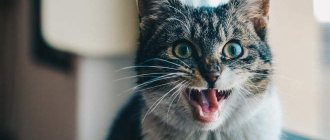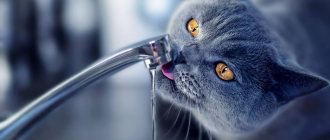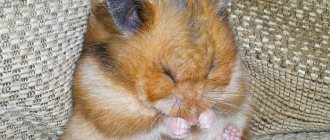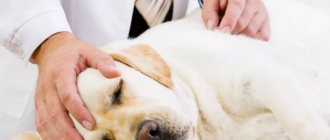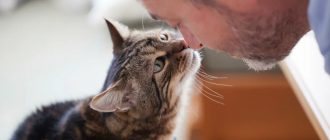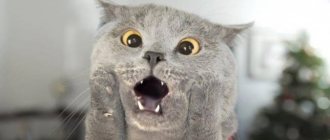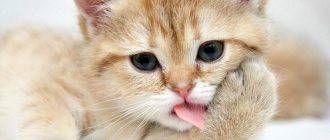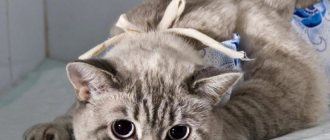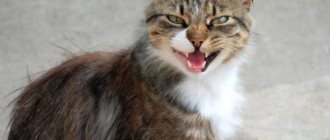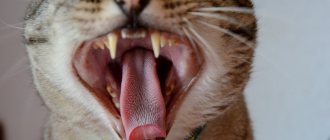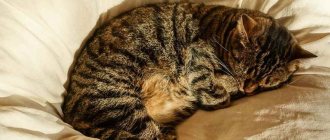Lethargy due to illness
Often a cat refuses to eat due to pathological disorders in the body. He is thirsty, so fresh water must be in the bowl at all times. If the state of hunger strike continues for several days, the pet weakens. It is advisable to contact a veterinarian and find out what type of infection is developing in your furry pet:
- Gastrointestinal diseases. Typically, pathological disorders in the gastrointestinal tract are manifested not only by loss of appetite. The cat develops prolonged diarrhea, which quickly depletes the body.
- Anorexia. Most often, due to a neuropsychic disorder in the form of anorexia, a small kitten suddenly stops eating. This is due to stress during meals - shouting loudly at the pet or hitting it. In the future, he simply does not approach the bowl of food.
- Liver problems. With pathological problems with the liver, the cat mostly lies down, getting up only to use the toilet or drink water.
- Tick bite. If, after a tick bite, a cat develops a dangerous disease such as encephalitis, the animal quickly loses strength. It does not get up due to paralysis of the limbs, sleeps all the time and can die without qualified help.
- Malignant formations. When a cancerous tumor appears in the digestive system, the cat wants to, but cannot, absorb food. If the disease is advanced, over time the animal will stop drinking even water, which will lead to death.
- Diseases of the pancreas. The cat often loses its appetite, turns away from food, getting up only to drink water. The functioning of the pancreas is impaired.
- Diseases of the reproductive system. Painful manifestations that negatively affect appetite appear in cats after castration surgery, and in females after sterilization. Cats begin to behave anxiously after a difficult birth and during the period of estrus.
If furry pets do not approach the food, stop playing, or drink a lot of water, this may indicate the development of diabetes. This condition is one of the symptoms of kidney problems, blood diseases or the appearance of worms.
This is interesting: What to do if your cat starts eating a lot
Reasons not related to health
Someone may be surprised to learn that your cat may refuse to eat due to stress or this is a manifestation of character. But it does happen, and quite often. If you offend your pet, not every one of them will “mark” the territory. Some animals, in response to undeserved insult, demonstratively refuse food, including their most favorite treats.
In addition, cats may not eat for several days for various reasons:
- Moving to a new home. Cats get very used to a place and every change of environment is stressful for them. In this case, all that remains is to wait until the pet gets comfortable in its new home.
- A sudden change in diet. When switching an animal to natural food or changing dry food, the cat can express its protest in this way. In such a situation, it is enough to choose exactly the food for your pet that he will like.
- After undergoing vaccination.
- During puberty. At this time, hormones are released in the animal’s body, which affects behavior and appetite.
- Dirty bowl. Cats are very clean, and most of them do not eat from dirty dishes.
- Wool in the stomach. Hairballs that enter the digestive tract during shedding clog the esophagus and stomach, causing discomfort to the animal. To prevent this, you should regularly comb the fur during the shedding period.
Problems with the mucous membrane
This condition is sometimes caused by small particles of food or objects that get stuck in the throat or esophagus. If the particles have sharp edges, then there is a high probability of injury to the mucous membranes, which causes pain and severe discomfort. Naturally, in this state the cat is unlikely to dream about food.
In addition, a foreign body in the stomach or intestines causes difficulty in moving food. Food stagnates and is not digested, and begins to rot. Putrefactive bacteria can lead to acute poisoning, so your pet should be seen by a veterinarian as soon as possible.
Trying to remove the stuck pieces on your own will aggravate the pain and, most likely, will not bring results. The only way to alleviate the condition before the doctor arrives is to drink plenty of cold water.
What diseases can cause
The following diseases can provoke loss of appetite and refusal of water in cats:
- malignant tumors - can be asymptomatic for a long time, most often affecting old animals, which at the same time begin to rapidly lose weight and prefer a sedentary lifestyle;
- renal failure - can occur in a pet at any age, while the cat rarely goes to the toilet, urine is excreted in small quantities;
- helminthic infestations are a common cause of loss of appetite in an animal at any age; in addition, symptoms such as stool disorders, weight loss, hair loss, vomiting, etc. are often present;
- fungal diseases - accompanied by deterioration of appetite, refusal of water, hair loss, skin rashes, itching and a general unsatisfactory condition in which the cat refrains from active games;
- intestinal obstruction - can be the result of stuck hairballs, helminthic infestation, while the pet does not go to the toilet and tries to hide.
Fungal diseases in cats can cause loss of appetite
Cats may refuse food and water during estrus, which is associated with hormonal changes in the body. As a rule, appetite is restored within a few days.
A friend’s cat suddenly lost his appetite and drank very little. At first she thought it had something to do with the extreme heat. Then the cat began to hide and lost a lot of weight. When I came to visit her and called my pet, he came out of hiding. He was terribly thin and could barely sit. Suddenly I discovered a sore on his withers and a lack of hair in this place. She advised me to immediately contact a veterinarian, as I suspected the presence of a tick. I recommend carefully examining your pets if their appetite worsens and they refuse water. Provoking factors are not always as harmless as they may seem at first glance. Now the cat has almost fully recovered, but long-term therapy is still required.
Reasons for refusing food - video
When you can't put off visiting a doctor
If within three days the cat’s appetite is not restored and it refuses to drink, then it is necessary to urgently consult a doctor, as the risk of dehydration is high. It is also important to visit a specialist if your animal has the following symptoms:
- vomit;
- hair loss;
- rash;
- loose stools;
- elevated temperature;
- weakness.
Attention! Owners should be wary if their pet hides all the time and avoids contact. This may indicate a severe pathological process in the body.
What should the owner do?
Force-feeding a cat is not the best option. First of all, it is important to treat your pet kindly, especially if he has recently experienced stress, for example due to a change in environment. Spend more time with your animal, play with it, and give it sedatives if necessary. If your cat's appetite does not return to normal, seek help from a specialist.
How and how to help an animal
If a cat refuses food and water, then the first thing to do is take your pet to a veterinarian. It is not possible to make a diagnosis on your own at home, so you need to call a doctor at home or take your pet to the clinic.
If it is impossible to get to the veterinarian in the next 24 hours, then you need to provide the cat with rest. To do this, you should prepare a clean litter; it should not be too soft or too hard. If an animal is hiding, you should not force it out of its hiding place. You can only place a bowl of food and fresh water nearby.
Bowls of water and food should always be available to the animal.
Under no circumstances should you try to give your pet any medications without first consulting a doctor. Otherwise, you can only cause harm and provoke life-threatening consequences.
If the doctor has determined the cause, then you should follow the specialist’s recommendations and give medications according to instructions in the required dosages. This must be done calmly; you must not cause pain to the animal. Before giving medication, the cat needs to be stroked, and the tone of voice should be calm. This way, the pet will tolerate the treatment better, will not resist too much and will recover faster.
Additional recommendations:
- If the cause is stress, then the cat should be left alone for a while. It is advisable to call her to eat in a gentle tone. A calm and quiet environment, the absence of extraneous noise and periodic stroking will help you recover from stress.
- If your pet doesn't like the food, you need to replace it as soon as possible. It is recommended to give preference to balanced foods rather than cheap options containing a lot of harmful additives.
- In case of gastrointestinal upset and poisoning, you can give the animal activated charcoal (500 mg per 1 kg of weight). In this case, the tablet must be crushed and dissolved in 1 tsp. water. It is most convenient to give medicine using a syringe without a needle. It is enough to do this procedure once before seeing a doctor.
- Ticks and fleas are eliminated using special antiparasitic medications. You should not use them on your own; you should first consult your doctor. However, if this is not possible in the near future, and the animal has fleas or a tick is found, you can purchase Bars or Celandine shampoo.
- If the cause is helminthic infestations, then treatment is carried out with the help of anthelmintic drugs. The medication should be given only according to the regimen recommended by the doctor. Otherwise, larvae may remain, which will provoke a relapse.
- To alleviate the condition of an animal with gum inflammation, you can use a solution of Miramistin or potassium permanganate. It is necessary to treat the gums using a cotton pad and the selected product. This needs to be done 2 times a day. Do not press on problem areas.
A weak solution of potassium permanganate can be used to treat inflamed gums
What to do if your pet doesn’t eat, doesn’t drink and constantly sleeps
If an animal does not eat or drink, and also sleeps constantly, then this is an alarming signal of serious health problems. However, in extremely rare cases this is associated with stress. In this case, the pet should be left alone and allowed to rest. There is no danger in inactivity after stress. If the animal is lethargic, does not eat or drink for another reason, then postponing a visit to the doctor is dangerous, since with a serious pathology the cat may die.
Some recommendations that will help you hold out until the doctor arrives:
- It is necessary to ensure that fresh air enters the room.
- Do not disturb the pet. If there are other animals in the house, then for safety reasons it is better to isolate them from contact with the sick cat.
- Make sure the water in the bowl is always clean.
- If there is a special medicinal herb for cats in the house, which breeders often grow in pots, then you can pick a little and put it next to your pet. If desired, the animal can be treated with such a safe remedy.
Attention! If a cat does not drink for more than 24 hours, it can cause death. In this case, water must be injected forcibly using a thin syringe without a needle, gradually pouring it into the mouth.
How to help a kitten
If the kitten does not eat anything or drink water, then first of all you need to pay attention to the nature of the food. Small pets need special soft food. It is impossible to give a kitten food intended for adult animals, since the gastrointestinal tract of babies is still very weak. Long-term refusal of water is dangerous, so you can give your pet water using a pipette. Every hour you need to give water forcibly. The liquid should be administered in small quantities - one pipette at a time is enough.
Giving your kitten water using a pipette will prevent dehydration
In addition, the kitten should be carefully examined for rashes, sores and fleas. Particular attention should be paid to the withers and ears. If everything is clean, then most likely the problem lies in the functioning of the internal organs, which can only be determined in a clinical setting.
Attention! If a kitten has a sore in the withers area, under no circumstances should you burn it with iodine or brilliant green. This may indicate the presence of a mite or lichen. In this case, you need to undergo the necessary tests and isolate children and other animals from contact with the kitten until complete recovery.
Prevention measures
Prevention rules that will help avoid problems:
- Make sure water and food bowls are always clean.
- Include only high-quality food in your pet's diet.
- Try not to expose your cat to stressful situations.
- Brush the coat regularly. This must be done using a furminator. This procedure will prevent the accumulation of hair in the cat’s gastrointestinal tract after licking.
- Eliminate the presence of cockroaches in the house, which can carry serious infections.
- Protect your pet from contact with street animals.
- Regularly wet-clean the floor.
- Do not give your cat any medications without consulting a doctor.
- Deworm your pet once every 4–6 months.
To protect your animal from a number of diseases, it is recommended to keep outdoor shoes in the closet. This is important to prevent the cat from coming into contact with bacteria that can easily be carried home on the soles.
If a cat loses its appetite and feels unsatisfactory, then there is no need to try to cure it at home. If the provoking factor is not serious and does not pose a threat to life, then the pet will recover in the next 24–48 hours. When this does not happen, you should immediately consult a doctor.
This is interesting: Sheba for cats - description of food
What to do for treatment
If the cat stops eating, then first find out the reason. Sometimes it’s enough just to change the bowl or food. If a pet has experienced a stressful situation, it needs help to adapt after it.
The situation is more complicated with medical factors. Any of the reasons described above requires treatment, but nothing can be done at home.
The pet is taken to the veterinarian, who orders an examination to identify the disease that caused the loss of appetite.
The treatment regimen, selection of medications and optimal dosage for the cat are determined by the doctor, based on the diagnosis.
Other reasons
If a cat has lost his appetite and has lost a lot of weight by drinking only water, this indicates that a pathogenic infection has entered the body. There may be other reasons for this condition:
- Changing your diet. The cat does not eat unusual food in situations of a sudden transition to another diet. There are cases of demonstrative hunger strike if the pet simply does not like the new food. Fatty foods cause vomiting followed by loss of appetite.
- Changing of the living place. An adult cat does not tolerate moving well. In a new place, he hides, climbing into dark places, is afraid to touch the bowl of food, and does not go to the toilet.
- Getting a throat injury. A stuck bone or other foreign object that makes swallowing difficult can cause painful damage to the throat. The danger comes from swallowing a sharp fragment that can get stuck in the intestines and cause obstruction. Vomiting begins, there is a bad breath, the cat does not eat anything.
- Painful lesions in the oral cavity. A cat even refuses its favorite food if it has ulcers in its mouth that cause burning pain. Bad teeth also cause suffering.
A number of other reasons
There are several other factors why a cat does not eat anything and only drinks water.:
- wrong diet. Perhaps the cat simply does not like the food that the owner offers him. Change the dishes and look at the cat's reaction;
- stressful situations. When changing place of residence or owner, the cat may become confused and miss the old way of life. Usually such nostalgia lasts a day or two. Then everything passes, and the cat is drawn into a new life;
- insufficient hygiene of cat dishes or food. People wash dishes after every meal. It will also be unpleasant for the animal to eat food that has disappeared, covered with mold and ants, or from a dirty bowl that has not been washed for a long time. Wash the saucer and evaluate the result;
- changing the location of the bowl. Put the saucer back in its original place and check if this is the problem;
- manifestation of character. Sometimes cats are just spoiled and mischief for any reason. Be patient for a day or two. The cat will get tired of this, he will get hungry and stop showing off. The main thing is not to force the animal to eat. The pet must drink water at this time;
- seasonal changes. In the summer, the cat refuses to eat, since food generates heat from inside the pet, which will be very unnecessary at that time of year. For three days, a cat can eat almost nothing, guided by its own well-being and instincts. The only salvation for the animal during this period is to drink water;
- fasting day. When an animal has eaten too much, it may not eat for the next few days, resting from meals;
- fur accumulated in the intestines. This may cause vomiting and constipation. Buy anti-hair medications for your cat at the pharmacy.
- beginning of sexual activity. The cat does not eat anything, but only drinks water, since she has only suitors on her mind, and cats have only continuous searches for their loved ones. This period of active life lasts several days. Then everything goes away;
If this is a kitten, do not allow it to eat anything for more than a day. But during these days he must drink water.
An old cat will lie down more, eat nothing, drink water - this way he will last a maximum of three days.
Anorexia
Catastrophic weight loss in the body can be caused by problems with digestion or the presence of worms in the body. This is especially common in kittens.
The baby's body is still developing, so it is natural that some food is not fully absorbed, creating discomfort in the intestines. For this reason, the baby may refuse food.
What to do? Give neutral food, boiled or well-heated, restorative broths and always fresh water.
If worms have settled in the esophagus, they poison the kitten’s blood with the products of their vital activity. This causes general malaise and weakness, and as a result, loss of appetite and lethargy.
Mandatory measures are to give an anthelmintic in exact accordance with the weight and age of the kitten (for example, Drontal, Milbemax tablets, Profender, Stronghold drops). Next, observe your pet’s urine and stool. Insertion of parasites is easy to distinguish in the urine, and the helminths themselves can be found in the stool. Even if there are no worms in the intestines, precautions will not be unnecessary.
Gastrointestinal diseases
Problems with the gastrointestinal tract in cats are determined by the following signs:
- vomit;
- diarrhea;
- discharge containing mucus;
- bloating;
- hard and tense stomach;
- strong odor from the mouth.
Among the most common problems is gastritis or the accumulation of hair in the stomach.
It’s not difficult to deal with a hairball: drinking plenty of fluids and special medications that help remove hair from the stomach will solve this problem (for example, “Phytomins”).
But gastritis is somewhat more complicated; its treatment requires time and effort. At the initial stage, it is necessary to give the cat boiled water and rice water. Then they use activated carbon diluted in water and medications prescribed by the doctor (most often these are stomach drops, Almagel). Food should be low-fat and exclusively unsalted.
Treatment should be carried out only after the doctor has established an accurate diagnosis. This is done by ultrasound of the digestive system or determining the level of acidity of gastric juice.
Liver diseases
Liver problems are difficult to diagnose visually. This is indicated by indirect signs:
- frequent diarrhea;
- change in color of mucous membranes to all shades of yellow;
- yellowing of the skin;
- brownish urine and gray stool;
- conjunctivitis.
The first sign of liver malfunction is jaundice. It is clearly visible to the naked eye - part the hairs on the cat’s body and evaluate the color of the skin. In its normal state it ranges from white to light pink. If yellowing or pronounced yellow spots are noticeable, then rush to the veterinarian.
The diagnosis is made after blood and urine testing. The doctor will prescribe treatment and determine a diet for each specific case.
Diseases of the circulatory system
Blood diseases are more common in older cats. A diagnosis can only be made based on laboratory blood tests. To do this, they study the composition of red blood cells and the level of hemoglobin. The cause of the disease may be disturbances in the functioning of the hematopoietic organs.
During the treatment, general strengthening and supportive medications (Radostin, Sanal Senior Lecithin), as well as foods high in iron, are prescribed. It is necessary to provide care and note changes in the condition of the sick cat.
Dangerous tick bite
Meeting with a tick is especially dangerous for cats that have access to free walks on the street. Parasites waiting in the grass can attach themselves to the cat’s body while relaxing in the fresh air.
If you notice that your pet categorically refuses to eat for several days, this may mean that the tick is drinking juices and is the cause of her weakness.
Inspect high-risk areas - tender abdomen, armpits, areas behind the ears. These are the warmest and most defenseless places where ticks often cling. If you find a swollen parasite, try to consult a doctor who will provide qualified assistance.
It is advisable to analyze the removed tick for health risks. After this, the doctor will prescribe the necessary treatment.
Symptoms of an incipient disease
What to do if the cat refuses to eat? First of all, you should observe your pet. If he is unwell, this will manifest itself not only in a lack of appetite, but also in behavioral characteristics:
- alarming and loud meowing;
- persistent desire to hide in a dark place;
- anxiety;
- lack of activity;
- apathy and lethargy;
- change in the color and smell of stool.
If you find at least one of the described signs, do not delay visiting the veterinarian.
If you suspect an infection, you will need a blood test at your veterinary clinic. If the result is positive, the doctor will prescribe antibiotics. If you suspect an intestinal disorder, feel the cat's abdomen, gently moving your fingers through its internal organs. If the animal screams sharply and scratches, it means that you have found a sore spot and can understand where exactly the cat has problems.
The cat does not eat, sleeps and only drinks water: reasons
In the wild, days of successful hunting alternate with failures. Therefore, cats often go hungry. For pets the situation is different. However, a young animal can undergo a five-day starvation diet without harm to its health, provided it has free access to water. For older cats, the critical point occurs after 3 days.
Animals suffering from chronic pathologies cannot go without food for two days. The kitten should not remain hungry for more than 24 hours.
If fasting continues for more than the specified period, lipidosis develops. The body mobilizes fat reserves that rush to the liver, causing its degeneration. The pathological condition often ends in death.
As for the drowsy state, it is typical for cats. The animal accumulates strength from 12 to 20 hours a day in order to waste energy in short moments of vigorous activity. Before going to bed and for some time after waking up, the cat looks lethargic.
There are 5 main reasons for refusing to eat:
- Change of environment, change of diet. Cats are emotional animals. Adaptation to a new place, the appearance of a new pet in the house, and the abundance of other cats at the exhibition distract from food. A change in diet can cause fattening failure. The cat does not like the taste, smell, appearance, consistency, or new dishes.
- The need to cleanse the intestines. In the wild, hunting luck doesn't shine every day. Therefore, the cat tries to eat for future use. Excess food requires drowsiness, decreased activity, and short-term fasting. Another need for cleaning is to expel from their intestines lumps of hair swallowed by licking.
- Sexual heat, pregnancy, lambing. The process of procreation is a more important problem than hunger.
- Heat. Cats do not have sweat glands. The cooling mechanism through the open mouth and protruding tongue is not expressed. Therefore, the animal protects itself from overheating by stopping calorie intake and reducing activity.
- Pathology . In this case, depression and anorexia are accompanied by additional symptoms - fever, digestive disorders, cough, pain reactions, stomatitis, and oral ulcers.
Be sure to read:
A kitten's eyes are festering: normal or pathological, reasons, what to do at home, medications
Diabetes
Cats, like people, have elevated blood sugar levels. This does not occur too often, but such a disease requires increased attention and timely treatment.
Reasons: monotonous, poor nutrition and lack of exercise. Diabetes most often affects animals whose activity is limited to the walls of a city apartment. You should watch neutered cats especially carefully - their pancreas function is often impaired due to excess weight.
Treatment of diabetes is a very complex and painstaking process, so not all owners are ready for it. Some prefer not to torture the animal, but to euthanize it.
If the diagnosis is confirmed by a specialist, then long-term treatment begins. It includes insulin injections and a special diet. You constantly need to measure your sugar level (about once every 2-3 hours). So the doctor prescribes an individual dosage and course of therapy.
If the measures prescribed by the doctor are followed, the cat can fully recover and live a long, fulfilling life.
The main reasons for refusing to eat
If your cat refuses to eat or spits out food, you should not ignore this behavior. The whole point may not be the whims of the animal, but its health problems. As the owner of a furry creature, you first need to diagnose the reason for this behavior. If you have any alarming symptoms, it's time to take your cat who is sick to the vet.
When should you not postpone a visit to the doctor if your cat is not eating?
Indications for immediate contact with a veterinarian are the following combination of symptoms:
- refusal to feed continues for more than 2 days, and for a kitten – one day;
- the cat does not eat or drink;
- the pet constantly licks itself;
- constant vomiting, drooling;
- diarrhea or constipation;
- skin rashes appeared;
- dry nose in combination with conjunctivitis and rhinitis;
- dry nose and increased or decreased body temperature.
How can you help if the cat doesn’t eat or drink anything, but only sleeps?
In a situation where the animal does not eat anything, but at least drinks, it is easier to understand. This is how the tailed animals regulate their well-being themselves, and their appetite returns over time.
What to do if you also refuse water? What to do if the cat sleeps all the time and does not react to the presence of the owner? This is a very dangerous condition, especially if the cat is very young or, conversely, old.
A small kitten does not yet have enough strength to cope with all illnesses, and in the body of an old cat, the protective resources are already depleted.
Therefore, if you are completely apathetic and refuse to eat or drink, immediately contact your veterinarian. If after two days the cat does not at least start drinking, feel free to consult a doctor. Qualified help can save the life and maintain the health of your pet!
Other situations
Problems with the reproductive system
Animals have great difficulty undergoing the rehabilitation period after castration or sterilization. More often than not, they simply hide in a distant dark corner and lick their wounds there. There is no need to disturb them in this state.
All that is required is to place the litter tray close and provide fresh drinking water.
The same rules can be applied to the period of the first heat in a young cat.
Stress
In the lives of our tailed friends, there are also difficult days, and even prolonged depression.
It can be provoked by:
- moving;
- parting with a beloved owner;
- separation of kittens from their mother (in this case it will be difficult for both the kittens and the cat itself).
If you notice that your cat is sad all the time, shows no energy and mostly sleeps, then you need to let her come to her senses. For a day or two, she may well arrange a fasting day for herself.
If food intake does not begin on both the third and fourth days, you should be concerned about the animal’s condition and start feeding it, at least through force.
